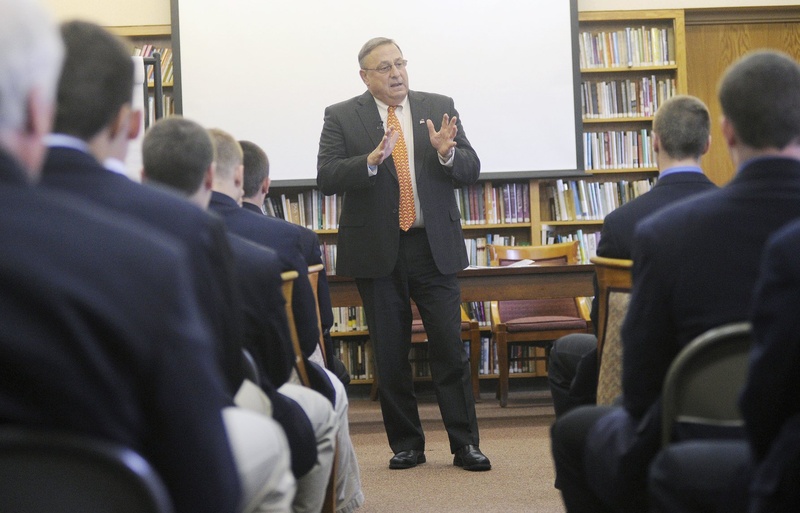AUGUSTA — A long-awaited, sweeping school-choice bill from Gov. Paul LePage, who wants to allow an unlimited number of charter schools and give public money to certain religious schools, is getting a cool response from Democrats in the Legislature.
L.D. 1529, a governor’s bill sponsored by Sen. Garrett Mason, R-Lisbon Falls, would also provide funding for students from low-income families to transfer to other schools and would help pay for room and board at public charter schools that are beyond reasonable commuting distance from their homes.
The bill also would allow colleges and universities to establish charter schools.
Under the proposal from LePage, who was educated at Catholic schools, religious schools would qualify for public funds if they comply with state standards applicable to other private schools. That provision effectively would repeal a 1981 law that prohibits public funding to sectarian schools.
If a municipality allows students to go to schools of their choice and pays their tuition, those students could go to religious schools that qualify under state standards, said the Department of Education’s spokesman, David Connerty-Marin.
“This simply removes a prohibition against a certain class of schools,” he said.
Democrats and education interests jumped on LePage for his proposals shortly after the bill’s text was made public Thursday.
“Those areas he would venture into, I would not venture into, ever,” said Rep. Bruce MacDonald, D-Boothbay, the Education Committee’s House chairman. “He’s known to be provocative and this is certainly that — provocative.”
In a news release, Lois Kilby-Chesley, president of the Maine Education Association, the state teachers union, described the bill as proof that LePage “will go to great lengths to cause even more harm to our schools.”
“The public has already said they don’t want their tax dollars to pay for religious or private schools,” she said in the statement.
According to state data, 22 religious schools would be eligible for public funding, including Cheverus and Catherine McAuley high schools in Portland.
Many other religious schools would not qualify, including Calvary Chapel Christian School in Orrington and the Friends School of Portland, a Quaker school in Yarmouth.
The bill encompasses a number of longstanding items in LePage’s education platform.
In January, he said legislation would be coming to allow more public charter schools. State law now allows for only 10 charter schools to be approved by 2022, when the cap ends. LePage’s spokeswoman, Adrienne Bennett, said that’s an “arbitrary number.”
LePage has criticized the Maine Charter School Commission for failing to approve several charter school applications.
MacDonald, the legislator from Boothbay, said there’s no proof that charter schools are better than conventional public schools. And in her statement, Kilby-Chesley said, “We can’t continue to allow more schools, with unproven educational success, to open if they are going to take money away from our public schools, which the majority of students attend.”
Bennett, however, said Maine’s two operating charter schools have already produced “very positive results,” and the administration doesn’t want to preclude groups from submitting charter-school applications.
“We have a very large state,” she said. “If you open that door, you open up more opportunities for students to have that accessibility of a charter school being closer to them.”
In 2012, a proposal by LePage to send some public funds to religious schools drew little support in the Republican-led Legislature. It got only three votes from the 13-member Education Committee, one of them from Mason, the sponsor of the new bill.
Last year’s bill received only eight votes in the Senate and 59 in the House, with then-Senate President Kevin Raye and then-House Speaker Robert Nutting, both Republicans, splitting on the bill. Raye voted against LePage; Nutting voted with the governor.
Although passage this year will be even more difficult with a Democratic majority, Bennett said the governor is just as committed to the idea.
“It’s bringing attention to something that is about getting more options for students and parents,” she said.
But MacDonald said that, ideologically, LePage “disparages the ‘public’ in public schools.”
“Education ought to be privatized, that’s what I think he believes,” he said of the governor. “That’s what I see in all of his initiatives.”
Michael Shepherd can be contacted at 370-7652 or:
mshepherd@mainetoday.com
Twitter: @mikeshepherdme
CORRECTION: This story was updated at 12:20 a.m. on Friday, May 10 to reflect that House Speaker Robert Nutting voted for Gov. LePage’s 2011 education bill.
Send questions/comments to the editors.


